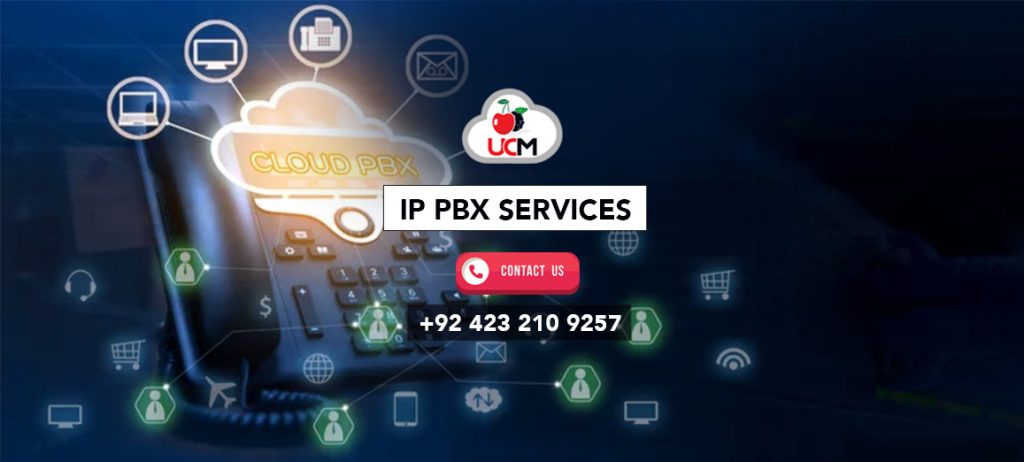Why Should Your Business Move to A VoIP PBX System?
How is A VoIP PBX System The Best Choice For Remote Teams?
Seamless collaboration and exceptional customer service are essential for a business’s success today. For this reason, advanced technologies of the digital age have replaced clunky wired phone systems and given way to scalable and flexible cloud-based internet solutions. The latest VoIP PBX System is one game-changing technology that has transformed how companies connect and communicate with customers and clients. The best part of this technology is that you do not need any hardware, landlines or server rooms as you can place and receive calls over the internet making it a suitable choice for remote teams. Let’s dive deep into the basics and advantages of this technology for your business.
What is A Cloud or VoIP PBX System?
This business phone system works like a standard PBX, but without using a traditional public switched telephone network (PSTN). Instead, it depends on an Internet connection to connect phones and transmit voice and video data. Cloud or VoIP PBX as a central hub to manage internal and external business phone calls. Meanwhile, the latest features like call routing, auto-attendant and conferencing make it the best alternative to the traditional wired-based telephone systems.
What are the Major Components of A VoIP System?
1. IP Phones
The advanced VoIP-based PBX systems also use IP phones like traditional phones but are connected to the internet. They convert sound into data to transmit or can be upgraded versions of legacy phone systems connected with adapters and software running on the computer or mobile phone. Your employees also need communication accessories like a microphone and headset.
2. Internet Connection
You need a reliable and stable internet connection to run your VoIP system to ensure smooth communication within and across the organisation. Companies should consult with their VoIP PBX service provider to learn about internet bandwidth requirements to run the system.
3. VoIP Gateway
This device converts the analogue voice and video signals into data packets to transmit over an internet network. It is an efficient way to connect traditional phone systems with modern VoIP networks. This system promotes collaboration among your in-house and remote teams so they remain on the same page about company matters.
4. PBX Server
It serves as the brain of the phone system that manages internal and external communication functions like voicemails, call routing and transcription. Although in a legacy system, the server is often kept in the physical location of your office, it is hosted in the cloud instead of onsite hardware in a VoIP system.
What Makes VoIP Different From Traditional Systems?
1. Infrastructure
On-premises and legacy PBX systems depend on hardware and analogue wired phone lines. They are usually located on-site. However, modern VoIP systems function digitally using an internet connection. Thus, the system requires minimal or no hardware until you use physical VoIP phones.
2. Cost
Companies require higher upfront costs in legacy systems for installation, maintenance, physical space and hardware. Conversely, VoIP systems require lower expenses as they can work on software and internet connection. This is why your remote teams can make and receive calls wherever, and whenever needed on an internet-connected device.
3. Flexibility
Latest cloud VoIP provide greater flexibility and scalability enabling your employees to stay in touch and collaborate regardless of location. Traditional phone systems do not support remote work due to dependency on on-premises hardware.
4. Maintenance
On-premises PBX systems need frequent updates and maintenance. In addition, companies have to hire dedicated IT teams or third-party service providers to keep phone lines connected. However, the service providers host the VoIP PBX so they are responsible for all maintenance, upgrades and security.
5. Integration
Traditional systems offer limited integrations and often require specialised services and a dedicated IT team. Cloud PBX systems function over the internet so they can easily integrate with existing business tools and apps.
What are the Advantages of VoIP for Your Business?
1. Offer Easier Collaboration & Flexibility
Modern businesses need innovative ways to communicate with customers, clients and teams. IP PBX systems contain advanced features like audio and video conferencing, call recording and management features. You can manage your entire business communication through call transfer, forwarding and 3-way calling without missing any calls.
2. Streamline Call Management Through the Online Portal
Staying connected is the top priority of companies besides managing the system. VoIP system allows you to view, manage and edit users’ access through the online portal. Meanwhile, your remote and in-house teams can collaborate easily and use the same system features.
3. A Less Expensive Option
By moving to the latest cloud VoIP PBX systems, companies can dramatically reduce the expenses on infrastructure and hardware. They can also manage their business from anywhere which reduces other unnecessary costs.
4. Better Solution to Future-Proof Your Business
IP PBX systems are better alternatives to physical phone systems as they allow you to scale for future growth and increase efficiency. Companies can easily add new features and users as their business grow. It also means your business phone system will always grow with your changing needs. Furthermore, you only have to pay for the features you need that reduce unnecessary expenses.
5. Ensure Business Continuity
Another important benefit of the VoIP system is resilience. There are minimum to no chances of unexpected shutdowns and cloud technology keeps your business data secure. In case of any disruption, your calls automatically move to backup centres.
6. Facilitate Remote Teams
VoIP systems are ideal for your remote teams who can access the system from any location and make and receive calls over the internet connection. Meanwhile, they can also collaborate with in-house teams with video conferencing features.
Closing Thoughts: Make the Right Decision for Long-Term Success
Today, traditional PBX systems have been overtaken by new technological advancements like cloud or VoIP technology. They allow companies to make and receive calls over the Internet without investing in costly hardware, wired landlines and bulky servers. Meanwhile, you can scale up and down with your business’s fluctuating needs through the latest unified communication system. The VoIP systems are an ideal option for remote teams who can communicate and manage voice communication within and across the organisation seamlessly. Meanwhile, a VoIP PBX System is easy to install and maintain. Are you ready to upgrade to a future-proof communication solution? Get CherryBerry UCM assistance to develop your business communication on modern lines.
Why is The IP PBX System Future For Business?
Why Do You Need an IP PBX System For Your Business Communication?
Every business evolves, grows and expands over time and never stands still so do your customer expectations. Effective internal and external communication is paramount to keep your business on the fast pace of progress, which is possible with the fusion of advanced technology, operational excellence and futuristic charm. Enter the IP PBX System as a game-changing technology that has come a long way from traditional PBX systems in terms of better connectivity and functionality due to integration with artificial intelligence. Let’s dive deep into the benefits and importance of IP solutions for remote teams and how they can future-proof your business.
A Journey to the Evolution of Business Phone Systems
1. Landlines as Foundation of Business Communication: Earlier, landline phone systems were used for business communication that provided limited features and functionality. They were considered reliable means for incoming and outgoing voice communication within a fixed location to connect with customers and partners.
2. The Advent of PBX Systems: As technology continues to evolve, traditional PBX systems come into the market as a better alternative to landlines. Companies can manage multiple lines and incorporate extensions easily with these systems. Your agents get the potential to forward calls or send/receive voicemails. It was the first step towards customised and flexible business tools.
3. Smartphone, Internet & VoIP Revolution: The arrival of the internet and mobile technology proved a game changer with business communication no longer constrained to desk phones. Your teams can collaborate virtually from whenever, wherever required through internet access leading to increased productivity and efficiency. Moreover, smartphones revolutionise business interactions by bringing email and other apps to the palm of your hand.
4. AI & IoT Integration: The future of communication is promising with the integration of artificial intelligence and the Internet of Things. IoT-based communication devices and AI-enabled virtual assistants will make business interactions more efficient and intuitive.
Understanding The Basics of IP PBX System
For years, PBX (private branch exchanged systems have served as internal business telephone systems to manage incoming and outgoing business calls. The latest IP (Internet protocol) telephony has replaced the traditional systems that allow establishing calls over the Internet connection. The main aim of IP systems is the management of the incoming and outgoing call traffic of a business. Meanwhile, VoIP solutions have made communication easier and streamlined. Moreover, businesses using IP technology can manage voice calls and other VoIP communication channels through a single network supporting better flexibility, scalability and agility.
Which Type of IP IPX is Suitable for a Business?
Making the right choice while moving from traditional legacy systems can be challenging for businesses. On-premises and cloud IP PBX are two common systems in practice that are descendants of legacy systems.
1. Analog PBX: Traditional or legacy PBX are the oldest known PBX systems that need physical equipment and are housed on-premises. They operate through copper-based telephone lines connected with a PBX box and kept in the office building. Analog systems are considered outdated today because they offer fewer features and integrations than the latest VoIP and cloud-based systems. Moreover, the PBX box contains a telephone switchboard that allows your team to communicate by connecting phones and interface between PSTN lines and private networks.
2. On-premises IP PBX: This IP system is placed in your office premises and can utilise an existing internal network and internet connection. It contains more advanced features than legacy PBX systems like call routing, IVR, conferencing, video calling and more. Meanwhile, the on-premises system works best when integrated with SIP trucks offering better resilience and more stable sound quality.
3. Cloud PBX: Virtual PBX is a digital system managed by a service provider and hosted in the cloud. A hosted or cloud PBX runs over an internet connection and benefits from PBX system functionality. This system offers more scalability and flexibility for businesses. Thus, they can integrate their phone systems with business CRM to make processes more efficient. In addition, it serves as a unified communication platform to streamline business communication processes.
Why Switch to Cloud-Based IP Systems? Top Reasons
Moving to a VoIP PBX system is wise for businesses looking to reduce their communication costs. These latest systems offer better reliability and allow you to go global or scale considering your business needs. Let’s learn about some important reasons that might convince you to switch.
1. An Easy-to-Use & Manageable System
Whether choosing an on-premises or cloud-based IP PBX, the system is managed through a web-based dashboard. It also means that you should not need to worry about maintenance, customisation and upgradation because the service provider is responsible for all this. This saves significant costs and time for your teams.
2. Quick to Deploy & Install
The IP system runs as software so you can install it more quickly and use it instantly. Your teams with initial IT knowledge can install the system and save time spent on hiring IT professionals. As this system works through the Internet, the cost of long-distance and international calls also lowers.
3. Allow Scaling Up & Down
Scaling is difficult in legacy systems while easier in cloud-based VoIP systems. Small businesses and established enterprises can invest in the system to stay dynamic. They can add extensions and phones according to their business needs and provide a friction-free experience to their customers.
4. Support Remote Working
The latest VoIP systems make your sales and marketing agents more efficient and productive. They can deliver a more seamless customer service experience through this unified communication system. Many service providers offer softphones and applications for mobile devices that enable your remote workforce to stay connected with customers and team members from anywhere. This also fosters a collaborative environment and keeps all your teams on the same page.
Final Thoughts: Make the Move
Indeed, a cloud-based IP PBX System has become a solution of choice for businesses today to manage incoming and outgoing calls. These systems have come a long way from legacy and wired systems as the evolution of the internet and the integration of AI has increased their efficiency. Businesses can keep their teams together, manage internal and external communication beyond office boundaries and improve business connectivity. In addition, these secure, flexible, futuristic and scalable solutions have made relocation easy as nothing needs to move during the process. Are you looking to switch from a legacy system to the latest cloud PBX? Contact CherryBerry UCM right away for expert assistance to grow and expand easily.
Achieving New Levels of Performance with Virtual IP PBX Solutions
Understanding The Significance of Virtual IP PBX Solutions
Suppose you are still using a traditional inflexible and expensive phone system to manage internal and external business communication that requires on-site maintenance. In that case, it may be the exact time to switch to more versatile Virtual IP PBX Solutions. These IP-based solutions are hosted offsite and companies can operate it on internet connections without using onsite hardware and bulky phone lines. This system typically depends on VoIP and cloud-based technology to manage your business communication and is often hosted by the service provider responsible for upgrades. It offers something beyond the level of a traditional phone system that handles communication across various channels other than calls.
How Do These Cloud-Based PBX Systems Work?
Virtual solutions sometimes called cloud PBX systems allow companies to make calls using an internet connection rather than depending on physical hardware. Cloud-based PBX systems and VoIP solutions offer the same functionality as traditional systems. However, outdated systems need copper wiring and landline phones to send analog data but advanced IP-based systems transfer voice data digitally through the internet. They have evolved even more today as they allow communication through other ways like instant messaging and video conference calls.
Comparing Cloud PBX with Traditional PBX
As the name suggests, virtual IP PBX solutions depend on an internet connection for business communication. On the other hand, on-site systems need costly hardware and bulky landlines for the purpose. These systems are beneficial for small companies and businesses that work around the globe through distributed offices and remote teams. Switching to the latest virtual solutions is an efficient way to get rid of desk phones and lower your operational costs. Traditional solutions also require regular maintenance and continuous support from IT teams. This is not the case with virtual solutions as service providers manage upgrades and maintenance themselves leading to smooth business communication.
Are Virtual PBX Systems Same Like Hosted Systems?
Both terms are synonymously used for each other. However, ‘hosted’ means a type of phone system that third-party providers manage somewhere else instead of in your office. It brings convenience for companies as they can communicate easily without making costly investments. In addition, service providers provide all maintenance and upgrade facilities for companies they need including IP phones and security.
Top Advantages of Virtual PBX System
1. Build a Professional Image of Your Business
An interesting reason to switch to the latest virtual solutions is image building. It helps businesses establish a professional image by providing streamlined internal and external communication. Moreover, as it facilitates multichannel communication other than voice calls, it allows customers and clients to contact you through SMS or video conferencing.
2. Facilitate Maximum Uptime
There are chances of frequent connectivity outages in the case of on-site phone systems. This is because they depend on traditional phone lines for communication. Any harm to these phone lines can disrupt your communication network. However, cloud-based systems need the internet for connectivity so they are free from such issues ensuring seamless and round-the-clock service.
3. Promote High-Call Quality
The role of phone call quality is a significant factor to consider for providing excellent customer service. Companies should ensure good call quality without noise and interruptions. This feat seems difficult to achieve through traditional phone systems. However, the latest systems allow communication free from external interference and noise.
4. Less Expensive Solution
Another compelling benefit of the virtual PBX system is that it is a cost-effective phone system due to the internet technology. For instance, traditional PBX systems need significant costs in terms of installation, maintenance, equipment purchase, and infrastructure development. However, when you invest in a virtual phone system then you only have to pay for the service you use.
5. Allow Multiple Integrations
Most companies use multiple tools and services to streamline their business operations. The integrations of these tools and services ensure you never lose your valuable data and also streamline various other business processes. Many virtual PBX service providers provide integration facilitates that make your business phone system an efficient and reliable communication service.
What Else to Expect From Virtual PBX Solutions?
6. Offer Enhanced Scalability
Companies expand and shrink over time and do not remain on the same level. Due to this factor, they should avoid investing in services, resources, and solutions that do not offer scalability. Instead, they should go for the ones that grow with your business. On-premises solutions do not provide such flexibility but cloud-based phone systems keep that potential and are ideal solutions to overcome this limitation.
7. Provide Convenience for Remote Teams
Today, many businesses are shifting to the online and virtual world. They allow their staff to provide services remotely. The latest IP PBX solutions allow your teams to access the system anytime, anywhere in the world, and use the same functionality your in-house teams use. This is because online PBX solutions function over the internet so they do not need any significant equipment or hardware. Your teams can collaborate without any hurdles through a reliable internet connection.
8. Promote Easy Installation
It is really easy to install virtual PBX systems as the process does not involve purchasing or installing any hardware. You can run these solutions without any specialised technical assistance. This way, even non-technical people can deploy and maintain the system.
9. Access to the Latest Security Features
Businesses should keep their customer and business data secure from security threats. A little data breach can affect your business performance. Investing in Virtual IP PBX Solutions means you do not need to worry about security features and updates. This is because managing all such issues is a headache for your service providers. It further helps you to focus on core business communication processes instead of these security issues.
10. Allow Real-Time Monitoring
Through hosted phone systems, companies can monitor their customer support operations in real time. They can get insights into calls in queue, routed, or resolved. Using this information, companies can easily identify gaps and develop strategies to make their communication process easier.
Final Thoughts: A Way Forward
The best thing companies can do to improve their customer service processes and increase client satisfaction is to replace inflexible, expensive, and outdated phone systems with virtual IP PBX solutions by CherryBerry UCM. This advanced system contains many remarkable and business-oriented features that make your internal and external communication easier. You can make phone calls, conduct video meetings, send instant messages, and integrate your business tools to ensure effective communication within and beyond your organisation. Call us today to get the right solutions that align with your business goals and achieve excellence in business communication.




